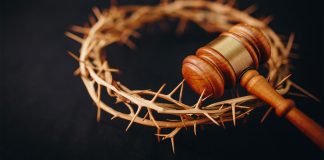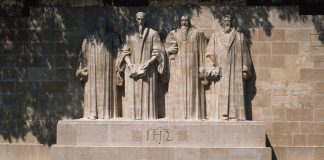Vaccine against death
What would you do if someone denigrated you in public? You could deny the information, but there is no guarantee that you will be able to rehabilitate your image. If you leave things as they are, there is a risk that silence will be interpreted as guilt. If you go to court, the process might take a long time and it may not...
There are hidden gospels that expose religious manipulation. True or false?
On the basis of ancient, hidden non-canonical gospels, some commercial and half-learned scholars propagate sensational discoveries, which are in fact both old and novel speculations arising from the Bible’s silence on some aspects of Jesus’s life.
John Calvin
In The Legacy of John Calvin, David W. Hall divides leaders into two categories. Some predict the future, and others change it. Calvin, Hall said, is in the second category.
How to grow together with God
We’d been married only a few weeks when we discovered that growing our spirituality as a couple was going to be much more complicated than the instructions on the packet suggested.
What does Philadelphia look like and where can we find it?
“Go instead to my brothers and tell them, ‘I am ascending to my Father and your Father, to my God and your God’” (John 20:17).
Jesus’s atypical vocabulary
From the speech of Jesus, who was a perfect speaker, we would expect there to be no fiery insults or harsh terms.
The rabbi (who never was a rabbi) who will never be forgotten
Given that no one could become a scholar without formal training, it is truly remarkable that Jesus, who was not formally educated, was nevertheless recognized as a “Rabbi” (Mark 12:14 cf. John 3:2).[1]
The crossless Cross
The mention of the city of Rio de Janeiro evokes images of the traditional carnival or the vast, exotic beaches such as Ipanema and Leblon. But most often we think of the huge monumental statue representing Christ the Redeemer (Cristo Redentor) with wide, open arms, looking down towards humanity from the top of Mount Corcovado (700m).
God, armed violence and genocide
One of today's dilemmas disputes, dialectically, the complex reality of the Bible and the secular way of looking at the "terror of history": Is God a source of morality superior to humanism, or not?
Instant regrets, memory wipes & free will
Have you ever done something you immediately regret? Perhaps you’ve let your emotions get the better of you, lost control and said something particularly harsh to a friend in the heat of a moment—you wish you could take the words back the moment they left your lips.
My stellar moments
It is said that God works through people. I am convinced that the people evoked in connection with my stellar moments—and I really would have liked to name them all—each contributed, in their own way, to my reunion with Divinity.
It’s just us and the Truth. Who judges whom?
The (metaphysical) Truth does not allow us to judge Him. According to the Bible, He expects to be believed and accepted so that He can be understood and evaluated. In contrast, the Truth is the One who judges us.
The source of motivation
Motivation is more than simply having the desire to wake up each morning with enthusiasm and a zest for life.
Is that you, God?
Christians believe that God speaks to people. But what does God sound like? Learning to recognise the difference between God’s voice and the myriad of other voices in your head takes much patience and practice. But it is possible!
A fulfilled life in the presence of God: the picture
A fulfilled life is built on the foundation of faith and the desire to imitate the character of God, in a world conceptualised around the truth.


























